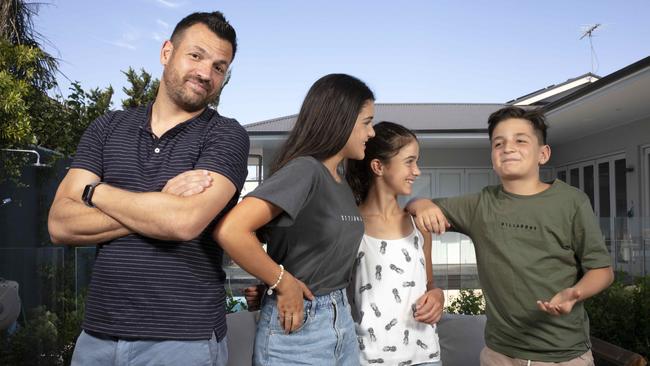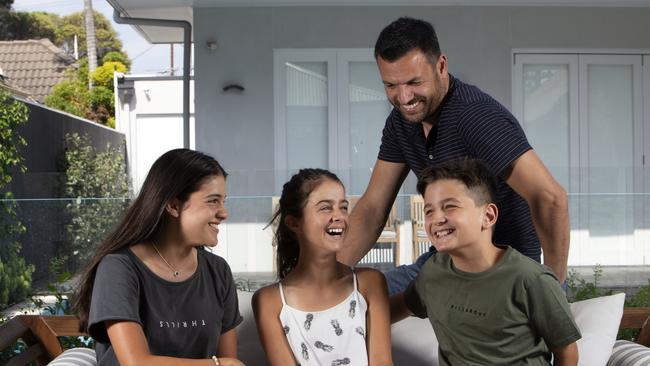The teen slang parents need to know before starting the New Year
As younger generations grow older, the slang they use evolves. So what are all the ‘hip’ new words and phrases our young ones are using? Here’s all the teenage slang you need to know to bring in the New Year.
National
Don't miss out on the headlines from National. Followed categories will be added to My News.
With a new decade comes a new generation of teens – and a whole new language for parents to decipher.
And it’s more than just “OK, Boomer” that parents of now not-so-little-ones need to understand.
Today’s teen slang includes words such as “thicc”, “thot” and “tea” – the latter of which is not something they drink when they visit with grandma.
The Advertiser has compiled a list of all the “in” phrases and words you need to know for 2020.
Flinders University lecturer in English and literacy Dr Kerrie Mackey-Smith said young people use slang to connect with their cohort and set themselves apart from older generations.
“Young people over 10 years of age tend to take up and construct new meanings to stand out and put their mark on the language that’s in use between them,” she said.
“But their children are not going to use their language. They will change it again and that’s what happens. Language is a breathing, living organism that we create among our communities.”
Words such as “thicc”, which describes someone with a big bottom and thighs in a positive way, and “fit”, meaning “good looking” are just some of the terms being used among the youngsters.

Dr Mackey-Smith said today’s slang was more global than ever before with social media
allowing new words to spread more widely.
She also said social media heavily influenced the type of words that are emerging with many being used to describe appearances.
“Social media has shifted the ability for many people to put themselves out there looking good,” she said.
“Media used to really only be the domain in the 1960s, 1970s, and 1980s of movie stars. You didn’t have the average person being followed by thousands of people if that’s what you want to spend your time doing.”
Professor Ghil’ad Zuckermann, chair of linguistics and endangered languages at Adelaide University, said today’s language says a lot about Gen Z.
“The youth today is as creative as ever,” he said. “Their neologisms, linguistic concoctions, are often short and catchy, and are therefore perceived as modernistic and fashionable.”
Social researcher Mark McCrindle said it was no problem if parents or grandparents could not understand what Generation Z was saying – and that it was usually easier in context.
“We find that it may not be understood by grandparents in its natural sense but in context it’s understood,” he said. “Ultimately, these are phrases that are generally used in colloquial settings and it’s not as though parents and grandparents can’t understand – it is a little bit context-dependent.”
Adelaide teen Simone Chiera said she regularly used slang terms around her friends which included “having beef”, “lit” and “tea”.
“I use them to keep up with the times. Everyone says them and they make sense when you talk. They’re easier to say and are catchier,” the 15-year-old said.
Simone said she understood the difference between talking to her friends and adults and would not to use slang words in front of her parents.
“They don’t understand what we’re saying so we don’t talk like that in front of them but I do with my siblings,” Simone said.
Her younger sister Zara said she used slang words because her friends did and also made the effort not to use them at home.
“Sometimes they come out accidentally (in front of my parents) but I don’t mean to,” the 13-year-old said.
Their friend Jack Cosenza, 11, said he commonly used the term “bot” which was short for ‘robot’. “It means that someone is bad at something,” Jack said.
“I sometimes say it to my younger sister when she annoys me.”

His father, John, said he had no issue with his son using slang terms.
“If we hear a term that we don’t know, we’ll ask about it and Jack tells us what it means. It’s just their way of expressing themselves,” he said.
“In saying that, there may be bad words that they use and, regardless if it’s a slang term or not, we want to educate our kids not to put others down or use derogatory terms and want them to be respectful of others.
“When I was younger we used words like ‘choice’ which meant something was good or cool or we would say that a person’s ‘on fire’ which would be the same as ‘lit’ now.”
He said young teens did not have the skills to determine when to use slang words at the appropriate time but it would come with maturity.
“As you get older you learn to adapt your vocabulary for different audiences but with kids they haven’t leant that skill to adapt the way they speak around different people.”
While ‘lit’ and ‘fam’ will be carried over to the New Year, according to a handful of teens the words ‘bae’ and ‘dab’ will be left behind in 2019.
Originally published as The teen slang parents need to know before starting the New Year
